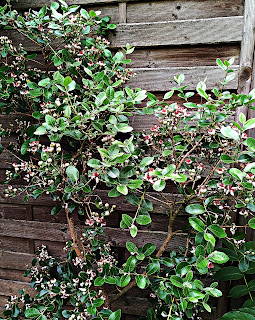31 July 2020
You Ain't Goin' Nowhere
24 July 2020
the keys to paradise
"Putting something called Nature on a pedestal and admiring it from afar does for the environment what patriarchy does for the figure of Woman. It is a paradoxical act of sadistic admiration."
". . . the belief that humanity will soon become involved in a deep and abiding worldwide partnership with nature. Millions of us will commit ourselves to reversing the long legacy of environmental degradation that threatens to destabilize the climate as well as the great ecologies that sustain life on Earth. We must develop a vast stewardship initiative, which will become the great work of our time. Fortunately, there are as many ways to serve the Earth as there are people willing to engage in this vast restoration project. It includes nothing less than stabilizing the planet’s climate as well as saving ourselves."
19 July 2020
virologists rule
"Two things. One, I just try to express how much I admire the real heroes on the front line for getting in there every day and essentially putting themselves at risk. I'm operating from a different vantage point where I am, but I almost miss the days of being in the trenches with you. So that's the first thing.
The second thing is that, you know, this is so stressful for all of us. I think we have to remember that we're gonna get through this. This is not something that's gonna be forever. We're gonna get through it. It's gonna be over. And we're going to look back and hopefully say we really gave it our best shot. And it's gonna be over from two standpoints: It's going to be over from a public health standpoint if we get it right, public health–wise.
But I think science and good biomedical research are also going to come to the rescue because we're going to get a vaccine, hopefully sooner rather than later, and we will get effective therapeutics. So for the people on the frontlines and in the trenches, hang in there with us. We're all in it together and we're gonna get through it. So that's my message to them."
17 July 2020
home office
10 July 2020
This is something that happens to other people in other times; something you might imagine, might read about – not experience. But it is real, it is happening. The plague is back. It never went away. Welcome to the future. No, welcome to the present, to the reality of an ineradicable highly contagious and sometimes fatal virus. There might be a vaccine for it at some stage, as there is for measles. There might not be, as there is not for HIV. A reliable treatment might be developed, as there is for HIV. Or it might not be, like measles.
In any event, there is a gap between what we know about our situation and what our gut believes, a gap that creates confusion, promotes outrage over inconveniences, complacency after early successes. We “know” what’s happening, but we don’t quite “feel” it. Our collective gut is still telling us normality is just around the corner. The reality has been slow to sink in because it’s beyond our privileged experience.
As you will yourself into the reality you perhaps start to understand how the millions before you didn’t understand either, didn’t read the signs, didn’t grasp calamity unfolding, were unprepared, were lost in history’s turmoil, thought their mass grave impossible even as they dug it. We’re out of practice. Mass disasters don’t happen here, not in our lifetime. The plagues and total wars and famines and deaths in the thousands and millions are confined to television screens. Even our hard times remain relatively soft in the broader, longer scheme of things. Other people’s individual tragedies have gone on regardless. In groups sometimes, in planeloads. Communities when fire or flood or landslide tear through. Bad, terrible, but this, this indiscriminate imposition … on everyone? And slowly the comprehension comes – it has always been everyone.
The single diagnosis and mass verdict, the individual execution and the genocide: Each one, one person, however many. One person facing mortality. We’re born to this. We will get used to it. Adapting is what we do best.
07 July 2020
I think that many of the good things in life, like close social contacts, being with a lot of people, festivals, big weddings, going out, going out to eat, celebrating, will probably only be possible with a vaccine with the "old" lightheartedness.
03 July 2020
songs and pictures
02 July 2020
imagine the world anew
Historically, pandemics have forced humans to break with the past and imagine their world anew. This one is no different. It is a portal, a gateway between one world and the next. We can choose to walk through it, dragging the carcasses of our prejudice and hatred, our avarice, our data banks and dead ideas, our dead rivers and smoky skies behind us. Or we can walk through lightly, with little luggage, ready to imagine another world. And ready to fight for it.








